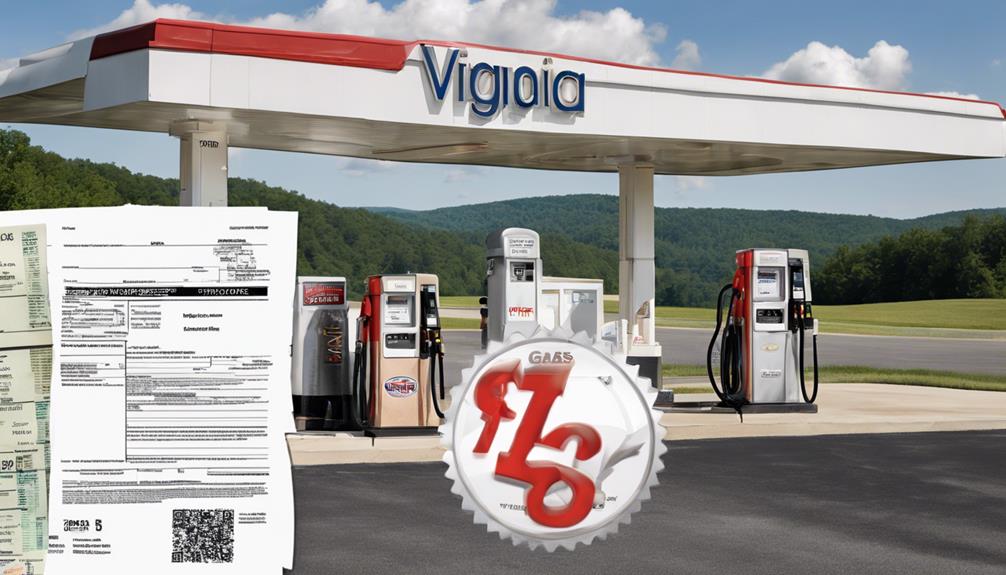When you think about the Virginia Fuels Tax, it's easy to overlook the role of the Supplier Bond and how it impacts both fuel distributors and consumers. This bond isn't just a piece of paper; it's a critical financial tool that ensures compliance with state regulations and protects the state's revenue. You might wonder what happens if suppliers fail to meet these obligations and how that could affect the broader fuel market. Understanding these dynamics might just change your perspective on the importance of regulatory measures in the industry.
Overview of Virginia Fuels Tax

The Virginia Fuels Tax is a crucial component of the state's revenue system, aimed at funding transportation infrastructure and services. When you fill up your vehicle, you contribute to this tax, which is essential for maintaining and improving roads, bridges, and public transit systems.
The tax is imposed on gasoline and diesel fuels, and it's calculated based on the number of gallons you purchase. Fuel tax bonds play a significant role in ensuring compliance with these tax obligations, providing financial guarantees that support government revenue for transportation projects Fuel Tax Bonds.
You mightn't realize it, but each time you buy fuel, a portion of the price goes directly to the Virginia Department of Transportation. This funding helps cover the costs of construction, repairs, and maintenance of transportation facilities across the state.
The Virginia Fuels Tax also plays a role in supporting environmentally sustainable initiatives, promoting cleaner transportation options.
It's important to note that the rates can change periodically due to adjustments in legislation or economic conditions. Staying informed about these changes can help you budget your fuel expenses effectively.
What Is a Supplier Bond?
Supplier bonds are essential tools for businesses in the fuel distribution industry, ensuring that suppliers fulfill their obligations to state and federal regulations. Essentially, a supplier bond is a type of surety bond that guarantees compliance with various laws and regulations governing fuel sales, distribution, and taxation.
When you obtain a supplier bond, you're providing a financial assurance to the state that you'll adhere to these rules. In a similar manner to money transmitter bonds, supplier bonds serve as a safeguard for maintaining industry standards and protecting consumer interests.
If you fail to meet your obligations, claims can be made against the bond. This means that the surety company will step in to cover any financial losses incurred by the state or affected parties due to your non-compliance. These bonds help maintain trust within the industry, ensuring that suppliers operate responsibly.
In Virginia, securing a supplier bond is often a prerequisite for obtaining licenses or permits needed to conduct business in the fuel sector. The amount of the bond can vary based on the volume of fuel sold and the specific regulations in place.
Understanding the requirements and processes involved in obtaining a supplier bond is crucial for your business's success in the fuel distribution landscape.
Importance of the Supplier Bond

A supplier bond plays a vital role in the fuel distribution industry, acting as a safeguard for your business and the state. This bond ensures that you're financially responsible and capable of fulfilling your tax obligations, similar to how cigarette tax bonds ensure compliance for distributors in their industry. Without it, your operations could face significant risks, including penalties and potential legal issues.
When you obtain a supplier bond, you're demonstrating your commitment to ethical business practices. This builds trust with both your customers and regulatory authorities. It shows you're serious about complying with state laws and regulations, which can enhance your reputation in the industry.
Moreover, having a supplier bond can give you a competitive edge. Many customers prefer working with bonded suppliers, knowing there's a financial safety net in place. This can lead to increased business opportunities and better relationships with clients.
In addition, the bond protects the state from potential losses due to unpaid taxes. If you fail to meet your obligations, the bond can be used to cover any shortfall, ensuring that the state remains financially secure.
Compliance and Regulatory Requirements
Navigating compliance and regulatory requirements is crucial for fuel distributors, especially since failing to meet these standards can result in hefty penalties. You'll need to stay updated on both federal and state regulations governing fuel distribution. In Virginia, this includes adhering to the Virginia Fuels Tax laws, which mandate that all distributors register with the Virginia Department of Taxation.
You must also ensure accurate record-keeping of all fuel transactions. This means maintaining detailed logs of fuel purchases, sales, and tax payments. Regular audits by state authorities can occur, so having organized records is essential for demonstrating compliance.
Additionally, be aware of the timing for tax payments. You'll be required to submit taxes on a monthly basis, and missing deadlines can lead to fines and interest charges. It's also important to familiarize yourself with any specific licensing requirements for your operation, as failing to secure the necessary permits can hinder your ability to conduct business legally.
Ultimately, staying proactive about compliance helps protect your business from potential legal issues and financial setbacks. By prioritizing these requirements, you can focus on growing your fuel distribution operations confidently.
Impact on Suppliers and Consumers

Understanding the impact of Virginia's Fuels Tax on both suppliers and consumers is essential for anyone involved in the fuel distribution chain. For suppliers, the tax can significantly affect profit margins. When taxes increase, they often pass those costs onto consumers, making it crucial for you to stay competitive while managing expenses.
This balancing act can be challenging, especially when market prices fluctuate.
For consumers, the Fuels Tax often translates to higher prices at the pump. You may notice these increases particularly during peak travel seasons or when oil prices rise. It's important to stay informed about these tax changes, as they can influence your budget and spending habits.
Additionally, suppliers are required to maintain compliance with various regulations, which can add operational costs. These costs might lead to fewer suppliers in the market, potentially reducing competition and affecting availability.
As a consumer, fewer suppliers could mean limited choices and higher prices in the long run.
Ultimately, understanding how these dynamics affect you can help you make informed decisions, whether you're a supplier strategizing for sustainability or a consumer budgeting for fuel expenses.
Conclusion
In summary, the Virginia Fuels Tax and the associated Supplier Bond play a vital role in maintaining the state's transportation infrastructure and ensuring compliance. By securing a Supplier Bond, you not only demonstrate your financial responsibility but also protect your business and the state's revenue. This bond fosters trust in the fuel market, benefiting both suppliers and consumers alike. Embracing these requirements helps create a more stable and reliable environment for everyone involved in the fuel industry.


